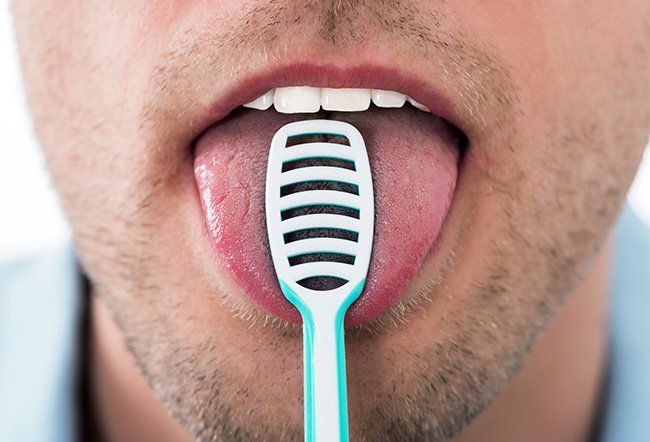Is It Bad to Scrape Your Tongue?

Tongue scraping is a way of removing bacteria, food particles, and other debris that cause bad breath from the surface of your tongue. Tongue scraping is a painless and low-risk procedure. However, there may be some associated risks, such as:
However, if done correctly and using the right technique tongue scraping can improve oral health and minimize foul breath (halitosis).
What are different types of tongue scrapers?
Different types of tongue scrapers come in various shapes and sizes:
- Brush tongue scrapers: Typically have a long handle like a toothbrush and a tip with ridges or short bristles to scrape the tongue, and must be replaced every 3-4 months of regular use.
- Plastic tongue scrapers: Made of thin plastic wire bent into a U-shape.
- Metal tongue scrapers: Made of thin, U-shaped, metal wire and typically last longer than plastic ones. Copper and stainless-steel tongue scrapers can be used indefinitely if cleaned regularly. Copper also has antibacterial properties that help get rid of microbes.
To use a tongue scraper, start at the base of the tongue and pull the scraper forward so that it slides and scrapes all the buildup away.
5 benefits of tongue scraping
- Improves sense of taste: Scraping gets rid of all the dead cells and other buildup from the surface of the tongue and creates space for taste buds to function optimally. It may help you appreciate certain flavors or textures better.
- Freshens breath. Microbes such as bacteria gather in the mouth at night because your mouth doesn’t produce as much saliva when you’re sleeping. Cleaning the tongue using scrapers removes bad-breath causing bacteria.
- Reveals the tongue's natural color: Regular scraping removes discoloration caused by debris accumulated on the tongue and helps the tongue return to its natural, pink and clean state.
- Boosts immunity: Your tongue functions as the first line of defense for the body. By scraping toxins regularly, you prevent the buildup of bacteria that can weaken your immune system over time.
- Promotes better digestion: Digestion starts in your mouth, and your saliva contains a variety of enzymes that helps break down food for easier digestion in the gut. If your taste buds get blocked due to the accumulation of mucus or other buildup, these receptors’ normal messaging function gets disrupted.

